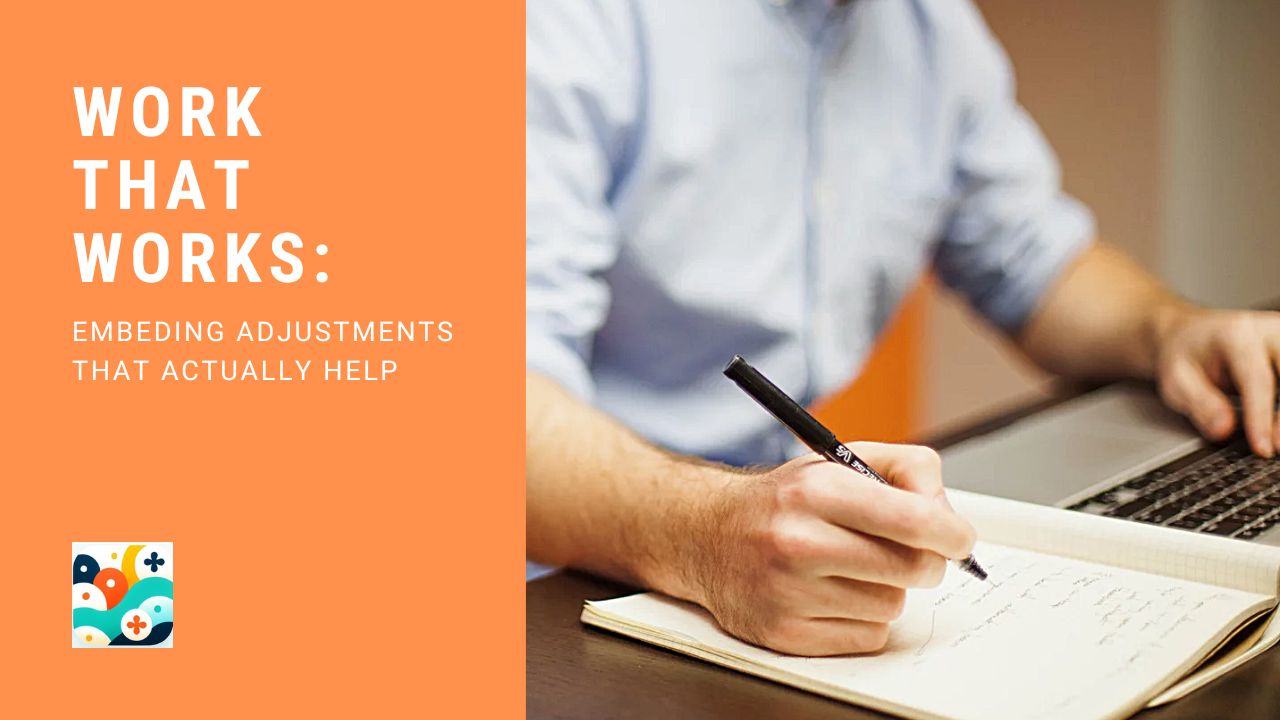Work That Works

Work That Works: Embeding Adjustments That Actually Help
Creating a truly neuroinclusive workplace isn’t just a nice-to-have—it's a game-changer. For both individuals and organisations, the right adjustments can unlock untapped potential, fuel productivity, and support genuine wellbeing.
At Mosaic, we believe thriving should be the norm, not the exception. That’s why our platform empowers teams with practical tools like the Workplace Passport, adjustment insights, and AI-powered personalisation to make inclusion both easier and more effective.
Why Workplace Adjustments Matter
Workplace adjustments—sometimes called reasonable adjustments—are tailored changes to how, when, or where work gets done. For neurodivergent professionals, they aren’t perks. They’re essential for levelling the playing field and enabling folks to:
- Harness unique strengths (like pattern recognition, creative thinking, or hyperfocus)
- Reduce sensory overload
- Navigate communication and social cues
- Maintain wellbeing and consistent performance
Stat block: According to ACAS, making reasonable adjustments isn’t just good practice—it’s a legal duty under the Equality Act 2010.
Common (and Effective) Adjustments
Mosaic supports teams to identify, personalise, and implement the right mix of adjustments. Here are some examples we often see making a real difference:
🧠 Environmental Tweaks
- Noise-cancelling headphones to reduce auditory distractions
- Adjustable lighting to soften glare and reduce overstimulation
- Partitioned workspaces or quiet rooms for focus and recovery
- Sensory-friendly spaces like Mosaic’s imaginary Cozy Cave or Hyperfocus Chamber
Example: Ali, a software developer, used their Workplace Passport to request a desk near natural light and away from high-traffic walkways. With these adjustments, their output improved by 40%.
⏰ Schedule Flexibility
- Flexible start/finish times to match energy patterns
- Remote or hybrid working options for comfort and control
- Scheduled breaks to manage energy dips
- Modified hours to sync with medication or personal rhythms
💬 Communication Support
- Clear written instructions instead of relying solely on verbal briefings
- Meeting agendas in advance to allow processing time
- Recording meetings for playback and comprehension
- Defined communication preferences (e.g., Slack over Zoom)
Getting Adjustments Right (and Keeping Them Right)
The most effective adjustments are:
- Individualised – One size fits no one. Mosaic’s AI-powered profiling suggests tailored ideas based on real needs, not labels.
- Collaborative – Involve the employee in designing what works.
- Adaptable – Needs evolve. So should support.
- Discreet and respectful – With the right tools, disclosure becomes empowering, not daunting.
The Power of the Workplace Passport
Mosaic’s Workplace Passport is a secure, shareable toolkit that:
- Helps individuals communicate their adjustment needs with clarity and confidence
- Supports managers with guidance tools and context-specific advice
- Provides continuity across roles, departments, and managers
- Integrates adjustment insights into broader inclusion strategies
Example: Priya moved from marketing to operations but kept her support consistent thanks to her Mosaic Passport. Her new manager instantly understood her needs—no awkward re-disclosure required.
Real Inclusion = Real Impact
Neuroinclusion isn’t just about compliance—it’s a competitive advantage. According to research from Deloitte, diverse cognitive teams are more innovative, adaptable, and better at solving complex problems.
But inclusion doesn’t happen by accident. It requires intention, the right tools, and ongoing dialogue.
Ready to Make Inclusion Work (for Everyone)?
Whether you're an HR leader rethinking policies or a line manager supporting your team—Mosaic makes neuroinclusive working practical, personal, and powerful.
Explore how our Workplace Passport, AI-powered adjustment recommendations, and manager support tools can transform how your organisation enables everyone to thrive.
👉 Learn more about Mosaic and start building a more inclusive future—today.